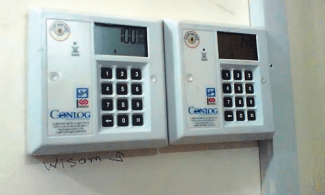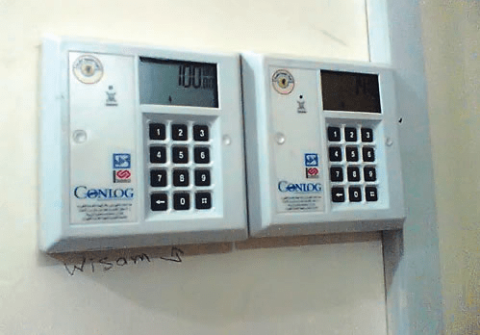
For six weeks, between December and January 2019, she was placed on direct connection—she was returned to the estimated billing camp. By the first month of 2019, a new meter had been given to her

With the installation of prepaid meters, patterns of distribution companies (Discos) transferring debts incurred under estimated billing climes to customers are increasingly becoming the norm.
SaharaReporters spoke with two clients of the Abuja Electricity Distribution Company (AEDC), who requested to stay anonymous, on the alleged scamming scheme of the firm. Both experiences differ slightly but have a common observation — AEDC takes out 50 per cent whenever they recharge their prepaid meters.
The six-month policy
Client one’s prepaid meter developed a fault in November 2018. For six weeks, between December and January 2019, she was placed on direct connection—she was returned to the estimated billing camp. By the first month of 2019, a new meter had been given to her. However, it came with a burden of its own.
“Every time I recharged the meter, I noticed they were removing 50 per cent,” she told SaharaReporters. She soon realized that a backlog of debt had been transferred from the estimated billing account, which was operated on her behalf by AEDC for six weeks, to the new prepaid meter account. The debt is N240,000.
“I challenged the company with many letters and they told me it’s a policy for them to backdate one’s consumption by six months because one might have been getting power after one’s meter spoiled,” she said.
For seven months, AEDC, which prides itself on having one of the best corporate governance records among its competitors, has been deducting half of her recharge.
“How can I be using ‘free light’?” she wondered out loud while speaking to SaharaReporters. Client one said she was informed a day before the interview that the deductions had stopped but she was yet to verify. Throughout the conversation, she had an anthem, ‘I am not the only one, they do this to many people.’
Client 2 entered into a rented apartment which had been vacated for six months in December 2017. He was forced as is customary with Discos, to inherit a bill of N147,078.50. This debt had accumulated for six years or some months less. The apartment’s prepaid meter got spoiled in 2011. Every month, from December to June 2018, he paid an estimated bill and a percentage of the N147,078.50 debt. By his calculation, all these amounted to ‘N130 something thousand.’
Client two received a prepaid meter in June 2018 and had it fine until the first month of the New Year.
“I was doing fine until January,” he said.
“In January, they now transferred the backlog. I won’t call it debt, the N147K, plus the heavy charges I was paying between January and June, (2018) into my prepaid meter account.“By January, I realized they were removing 50 per cent of any money I put on my prepaid meter,” he says.
Client two recalled that he was consuming an average of N7,000, based on estimates of how much units he loaded in his prepaid meter before the arbitrage began. He compared this to the estimates AEDC were giving him, as he reminisced on his experience.
“They were charging me between N31,000 and N40,000. They even disconnected my power supply at some point. Imagine paying thirty-something thousand for a N7,000 apartment.”
Reacting to the experience of its customers, Oyebode Fadipe told Sahara Reporters that AEDC does not make any arbitrary decisions on the accounts of their clients.
He noted that the power to estimate electricity consumption charges was given to it by the Nigerian Electricity Regulatory Commission (NERC).
“Where the customer, however, holds the view that the estimated billing migrated to the meter does not represent the extant fact, he has a right to complain about it and it will be looked into and resolved in his favour where the facts are cogent and compelling. It is important to state that the customer admitted consuming electricity,” Fadipe said.
Client two, who had to acquire a new prepaid meter and had his power supply disconnected at some point before he received his electricity vending device, had his case firmly spelt out to AEDC.
Fadipe went on to say the 50 per cent deduction on prepaid meter recharge, is not sacrosanct.
He said it was not done arbitrarily but ‘always negotiated with the customer to enable him to declare his capacity to pay the outstanding over some time.’ Both AEDC customers that SaharaReporters spoke said they only noticed the deductions and were not informed beforehand.
Fadipe said the six-month policy only comes into effect as a means of retrieving energy collected by the customer bypassing his or her meter. He said it is a power donated by the regulatory agency and it is intended to discourage energy loss through the bypass, which amounts to a desire to take energy without a corresponding willingness to pay for it.’ Client one told SaharaReporters that she had vehemently denied any such accusation to AEDC officials.
Complaints around metering and billing have been the chief concern of electricity customers. In its 2018 first-quarter report, NERC said 64,197 complaints were made — 59 per cent of all issues reported in just three months. The regulator said it would audit the handling of the resolution of these disputes.